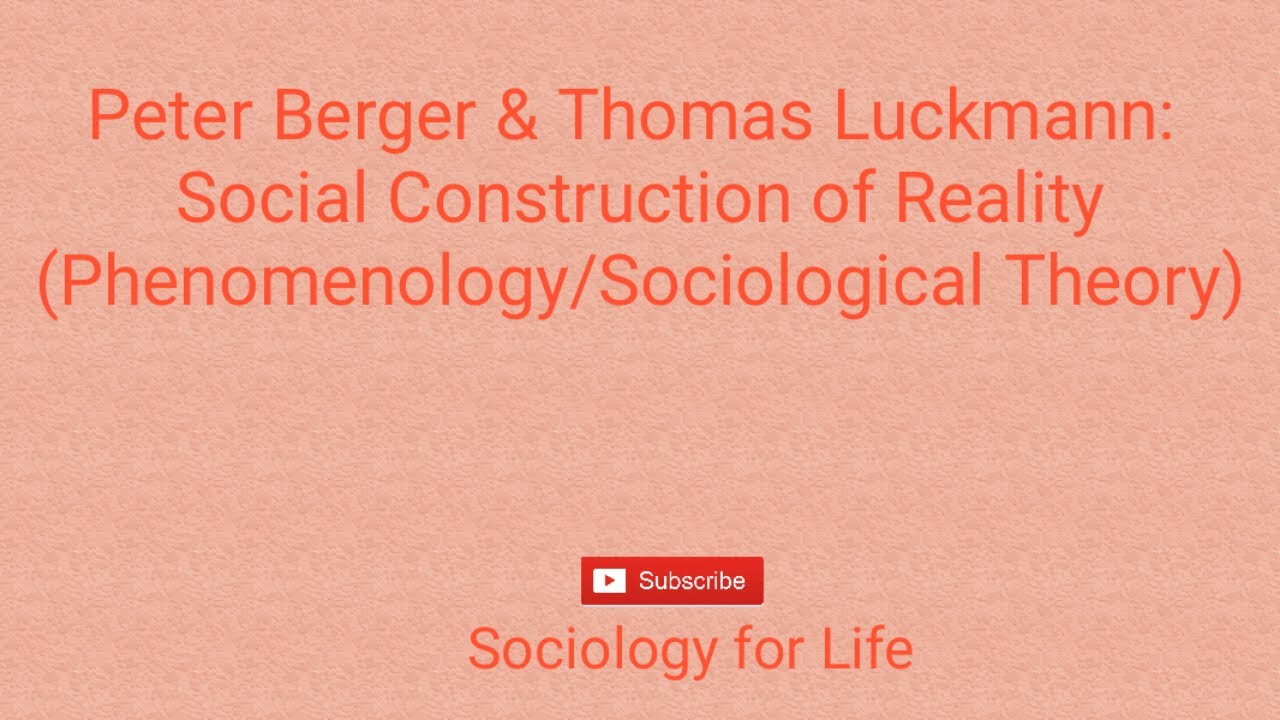The Theory of the Social Construction of Reality
Summary
TLDRThe theory of social construction of reality posits that our understanding of reality is not objective but shaped by social interactions and interpretations. It emphasizes the role of shared meanings, symbols, and social institutions in constructing reality. This theory highlights the influence of power dynamics, the contestability of reality, and the potential for individuals to challenge and change societal norms. It encourages questioning assumptions, embracing diverse perspectives, and working towards a more equitable society.
Takeaways
- 🌐 Reality is subjective: According to the theory, reality is not an objective, unchanging entity but is created and shaped by our social interactions and interpretations.
- 🗣️ Shared meanings and symbols: We use shared meanings and symbols, such as language, to communicate and make sense of our experiences, which helps in constructing reality.
- 🏛️ Social institutions and structures: Institutions like family, government, and media play a crucial role in shaping our beliefs, values, and attitudes, thus constructing reality.
- 💪 Power and inequality: The construction of reality is influenced by power dynamics, with those holding more power having a greater ability to shape and define it.
- 🤝 Contested reality: Since reality is socially constructed, it is subject to contestation and change, with different groups and individuals having potentially conflicting interpretations.
- 🔄 Changing reality: Reality is not static; it evolves and changes over time as society changes, reflecting our shifting understanding of the world.
- 🏃♂️ Individuals can challenge reality: Despite the influence of social institutions, individuals can challenge and change reality through their actions and beliefs, leading to social change.
- 🤔 Questioning assumptions: The theory encourages us to question our assumptions about what is real and to recognize the role of our social interactions in shaping our world view.
- 🌟 Open to perspectives: It is important to be open to different perspectives and interpretations, acknowledging that reality is not fixed but is always subject to change.
- 🌱 Towards a more equitable society: Recognizing the social construction of reality can help us work towards creating a more just and equitable society by challenging existing norms and beliefs.
Q & A
What is the main idea behind the theory of the social construction of reality?
-The theory of the social construction of reality posits that reality is not an objective, unchanging entity but is instead created and shaped by our social interactions and interpretations, leading to different views of reality among individuals and groups.
How does the theory suggest that reality can differ from person to person?
-According to the theory, reality can differ from person to person because it is a product of individual social interactions and interpretations, which can vary widely across different cultures, groups, and individuals.
What role do shared meanings and symbols play in constructing reality?
-Shared meanings and symbols, such as language, are essential for constructing reality as they facilitate communication and enable us to make sense of our experiences, thus helping to create a collective understanding of reality.
How do social institutions and structures contribute to the construction of reality?
-Social institutions and structures, including the family, government, and media, play a crucial role in shaping our beliefs, values, and attitudes, providing a framework for understanding the world and influencing the construction of reality.
Why is the social construction of reality not a neutral process?
-The social construction of reality is not neutral because it is influenced by power dynamics and inequalities within society, allowing those with more power and influence to shape and define what is considered real.
What does it mean for reality to be 'contested'?
-Reality being 'contested' means that it is subject to different interpretations and can be challenged and changed, as various groups and individuals may have conflicting views on what constitutes reality.
How is reality described as changing over time?
-Reality is described as not being fixed but constantly evolving and changing as society changes, reflecting the ongoing process of social interaction, interpretation, and the influence of social institutions.
What power do individuals have in the social construction of reality?
-Individuals have the power to challenge and change reality through their actions and beliefs, potentially instigating social change by questioning existing norms and creating new meanings and interpretations.
What implications does the theory of the social construction of reality have for our understanding of the world?
-The theory challenges us to question our assumptions about what is real, recognize the role of social interactions in shaping our understanding, and be open to different perspectives, acknowledging that reality is not fixed and is always subject to change.
How might recognizing the social construction of reality help in creating a more just and equitable society?
-Recognizing the social construction of reality can help in creating a more just and equitable society by encouraging us to challenge existing power structures, question the status quo, and work towards a collective understanding that is more inclusive and representative of diverse perspectives.
Outlines

此内容仅限付费用户访问。 请升级后访问。
立即升级Mindmap

此内容仅限付费用户访问。 请升级后访问。
立即升级Keywords

此内容仅限付费用户访问。 请升级后访问。
立即升级Highlights

此内容仅限付费用户访问。 请升级后访问。
立即升级Transcripts

此内容仅限付费用户访问。 请升级后访问。
立即升级浏览更多相关视频

Peter Berger & Thomas Luckmann: Social Construction of Reality #Phenomenology #Berger and Luckmann

Berger and Luckmann theory of Social construction of reality

What does 'The Social Construction of Reality' Mean? - by Dr. Dennis Hiebert

¿En qué consiste? El supuesto filosófico / Idealismo

Constructivism as a Philosophy of Research

Sosiologi Komunikasi - Konstruksi Sosial
5.0 / 5 (0 votes)
